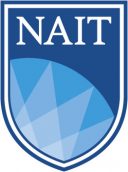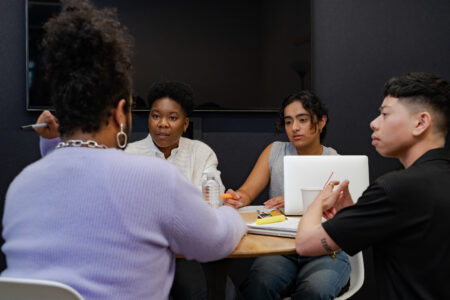Meaningful Queer Mentorship
For 2SLGBTQIA+ professionals, the lack of peer support and mentorship can be a significant challenge in the workplace and indicative of broader systemic issues within an organization. While some may benefit from formal mentorship and sponsorship programs within inclusive workplaces, many must resort to innovating community-driven programs to better support 2SLGBTQIA+ peer mentorship and community building in the workplace.
Through internal mentorship and sponsorship initiatives, the Queers and Peers Mentorship (QPM) program at the Northern Alberta Institute of Technology (NAIT)‒one of our Proud Partners‒is committed to creating a safer, more respectful, inclusive, and connected community at NAIT. This case study explores how this community-driven project builds meaningful support systems to connect mentors and mentees and develop stronger 2SLGBTQIA+ leaders within their communities.
Case Study: Queering Mentorship – Transforming Workplaces through the Queers and Peers Mentorship Program*
In the dynamic realm of career development, the Lead with Pride: Best Practices for Advancing 2SLGBTQIA+ Leadership report (Pride at Work Canada, 2023) underscores the pivotal impact of meaningful mentorship, sponsorship, and support systems on the career trajectories of Two-Spirit, queer, and trans leaders. Beyond emphasizing the importance of traditional support structures, the report illuminates the potent influence of peer mentorship and shared experiences. Leaders in the study highlight the transformative value of these connections, accentuating their role as catalysts for guidance, encouragement, and inspiration. Recognizing the unique insights cultivated through organic connections, the report emphasizes the distinctive value of peer mentorship in addressing challenges rooted in shared lived experiences.

This case study seamlessly extends this narrative, spotlighting the intrinsic value and impact of peer mentorship on professional trajectories as well as workplace inclusion. The Queers and Peers Mentorship (QPM) program at the Northern Alberta Institute of Technology (NAIT) actively amplifies the voices of inclusion and supports often unrecognized workplace leaders. Historically, the workplace has been a challenging environment for 2SLGBTQIA+ individuals, where their narratives are often overlooked or dismissed as too personal. The QPM program seeks to challenge this status quo by creating a platform for meaningful dialogue and understanding. Aligned with the report’s themes, the QPM program champions the transformative potential of peer mentorship and shared experiences, cultivating a supportive and inclusive environment for the 2SLGBTQIA+ community within the NAIT community.

A group of co-workers of varying genders having a meeting.
The Gender Spectrum Collection – Vice.
Queers and Peers Mentorship (QPM) program
The Queers and Peers Mentorship (QPM) program at NAIT is a staff-led initiative designed for all instructors and staff. The program encourages mentorship participation from individuals with lived experience or learned knowledge of the queer community, including allies. Mentors, who may or may not identify as queer, play a crucial role in fostering conversations and relationships, aiming to contribute to NAIT’s inclusive and connected community. Mentees, comprising staff / faculty seeking to broaden their understanding of the queer community, are encouraged to participate, regardless of their knowledge level. The matching process occurs after a registration period, where participants explore potential connections before submitting preferences. The mentorship relationship is flexible, with participants deciding when, where, and how often they meet. The program also hosts optional events, such as virtual discussions and in-person sessions during NAIT’s Pride Week.
Since the start of the program in 2021, some mentees have come back year over year to gain a new mentor every year and vice versa. There have also been mentees who have come back as mentors giving back to the program that impacted them. The initiative emphasizes the significance of ongoing relationships, contributing to NAIT’s commitment to creating a safer, more respectful, and better-connected environment for the queer community.
The QPM program has clear objectives:
- Knowledge Building: Participants gain insights into the issues faced by the queer community.
- Relationship Building: Building a network of support within the queer community.
- Diversity Awareness: Developing an understanding of the diverse experiences within the queer community.
- Perspective Incorporation: Integrating diverse perspectives to strengthen work and team dynamics.
- Inclusive Environment: Creating a positive and respectful work and learning environment.

Transfeminine and non-binary colleagues talking in an office.
The Gender Spectrum Collection – Vice.
Roles of the Mentee and Mentor:
Mentees are tasked with initiating and driving the relationship, absorbing the mentor’s experiences, building empathy, and combating prejudice. Mentors, on the other hand, commit to being available, developing trust, and using the relationship to contribute to a safer, more respectful, inclusive, and connected community. Mentors are encouraged to reflect on successful mentorship relationships in their lives, translating those insights into their approach in the QPM program. This self-reflection aims to enhance the effectiveness of mentorship within the program. While advising seeks direction, coaching clarifies goals, the QPM program focuses on mentoring, sharing wisdom, knowledge, and experiences. It provides a medium to long-term relationship for individuals to learn from the lived experiences of others within the 2SLGBTQIA+ community.
Key points:
- Brings community together and is staff-led.
- Leads to the development of both mentees and mentors.
- Is flexible as to the nature of the relationship with what works for each mentor and mentee.
Feedback from Participants:
“I loved participating in the inaugural Queers and Peers Mentorship program for a few reasons. Firstly, creating the space and allocating time to talk about topics and experiences that are outside my usual daily conversations was very rewarding. Secondly, I am now better informed about my own biases and how they may create comfortable or uncomfortable situations. And finally, the program allowed me the opportunity to practice a variety of pronoun combinations. This is new to me, so I appreciate all the opportunities I got to practice. My eyes were opened to the many privileges that I experience every day that are not available to my queer friends, family and colleagues.” – Jenna
“As a mentor, it was extremely fulfilling to engage with someone trying so hard to be an ally and really wanting to learn about the 2SLGBTQ+ community. It brought me a sense of joy and renewed hope that when people can just open themselves up to meet and get to know a queer person, so much hurt can be prevented and the world can be changed for the better.” -Name withheld
“I truly enjoyed this experience, and I’m grateful for my mentor who shared with me their time and knowledge. This was an enlightening experience for both my personal as well as my professional life! My mentor became my friend, and I know I have someone to reach out to keep learning!” – Nela
* Content written by the NAIT team
